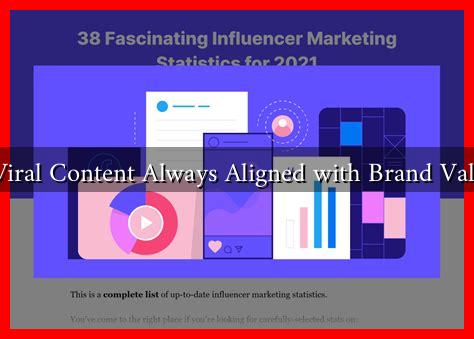-
Table of Contents
Is Viral Content Always Aligned with Brand Values?
In the digital age, the quest for viral content has become a holy grail for marketers and brands alike. The allure of reaching millions of viewers in a matter of hours is tempting, but it raises an important question: Is viral content always aligned with brand values? This article explores the relationship between virality and brand integrity, examining the potential risks and rewards of chasing viral trends.
The Nature of Viral Content
Viral content is defined as any piece of media that spreads rapidly through social sharing, often characterized by its emotional appeal, humor, or relatability. According to a study by HubSpot, 92% of consumers trust recommendations from friends and family over any other form of advertising, which underscores the power of shareable content. However, the question remains: does virality come at the cost of brand values?
Understanding Brand Values
Brand values are the core principles that guide a company’s actions, decisions, and overall identity. They reflect what a brand stands for and how it wants to be perceived by its audience. Common brand values include:
- Integrity
- Innovation
- Customer-centricity
- Sustainability
- Diversity and Inclusion
When brands create content, it is crucial that this content aligns with their established values. Misalignment can lead to consumer backlash, loss of trust, and long-term damage to brand reputation.
The Risks of Viral Content
While the potential for increased visibility is enticing, there are significant risks associated with pursuing viral content that may not align with brand values:
- Consumer Backlash: If a brand’s viral content is perceived as insensitive or out of touch, it can lead to public outrage. For example, Pepsi faced significant backlash for its 2017 advertisement featuring Kendall Jenner, which was criticized for trivializing social justice movements.
- Brand Dilution: Constantly chasing trends can dilute a brand’s identity. Brands like Old Spice have successfully reinvented themselves, but not all brands can afford to stray too far from their core values.
- Short-lived Success: Viral content often has a fleeting nature. Brands that rely solely on virality may find themselves struggling to maintain engagement once the initial buzz fades.
Successful Examples of Aligned Viral Content
Despite the risks, there are brands that have successfully created viral content while staying true to their values:
- Dove’s Real Beauty Campaign: Dove’s campaign focused on body positivity and self-esteem, resonating deeply with its audience. The campaign went viral while reinforcing Dove’s commitment to authenticity and self-acceptance.
- Always’ #LikeAGirl Campaign: This campaign aimed to empower young girls and challenge gender stereotypes. It went viral and aligned perfectly with Always’ brand values of female empowerment and confidence.
Strategies for Aligning Viral Content with Brand Values
To ensure that viral content aligns with brand values, companies can adopt several strategies:
- Know Your Audience: Understanding your target audience’s values and preferences can help create content that resonates and feels authentic.
- Stay True to Your Mission: Always refer back to your brand’s mission statement when creating content. This will help maintain consistency and integrity.
- Engage in Social Listening: Monitor social media trends and conversations to ensure that your content is relevant and sensitive to current issues.
Conclusion
In conclusion, while viral content can offer significant benefits in terms of visibility and engagement, it is not always aligned with brand values. Brands must tread carefully, ensuring that their pursuit of virality does not compromise their integrity or alienate their audience. By understanding their core values and employing strategic content creation, brands can achieve virality without sacrificing their identity. Ultimately, the most successful viral campaigns are those that resonate with audiences on a deeper level, reinforcing brand values while capturing attention.

